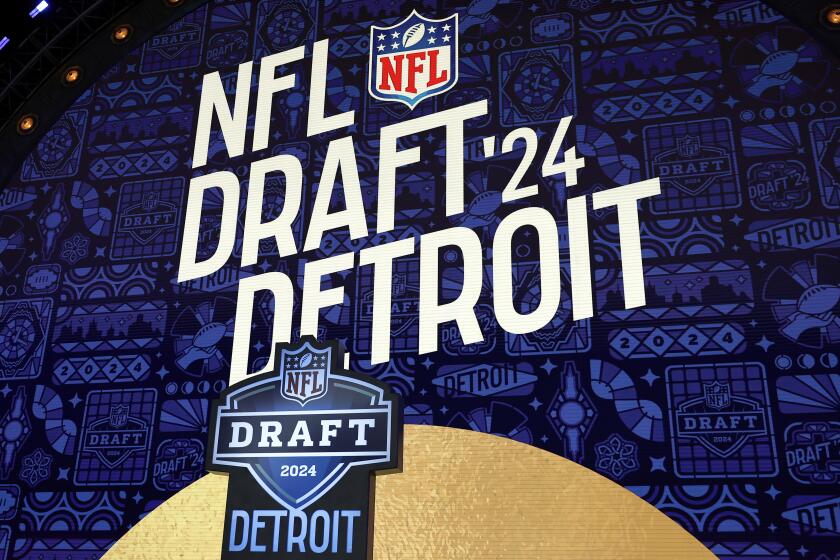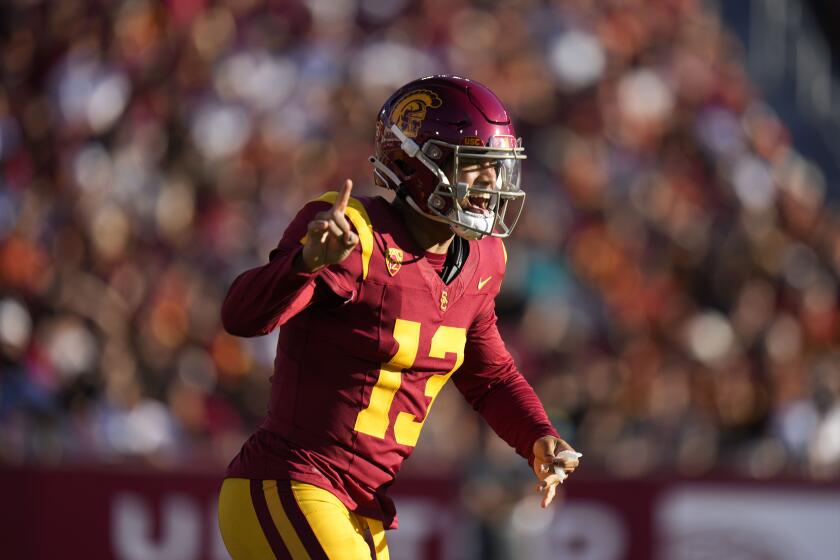Divorce settlement solves one problem for Frank McCourt
Two years and three days after Frank and Jamie McCourt issued a statement to announce their separation, the McCourts issued a statement to announce a divorce settlement.
Jamie McCourt, who called herself “the face of the Dodgers” in her initial divorce filing and fought her ex-husband for half ownership of the team, agreed Monday to surrender the bankrupt team to Frank McCourt.
She walked away with a promise — but not a payment — of about $130 million. He knocked down one obstacle on a rugged course that still stands between him and continued ownership of the Dodgers.
Questions and answers about the divorce settlement, based on discussions with people familiar with the agreement who spoke anonymously because the document has not yet been filed with Los Angeles Superior Court:
If the Bankruptcy Court does not order the sale of the Dodgers, do the terms of the settlement call for a sale?
If Frank still controls the Dodgers in the spring, and if he has not paid Jamie in full by then, he must put the team up for sale.
Can Frank get $130 million without selling the team?
Frank has asked the court to let him auction the Dodgers’ television rights. He could use $130 million from those proceeds to pay Jamie.
If the court grants the auction but mandates the money be used only for the Dodgers, then Frank could try to sell a minority share in the team or some of the land surrounding Dodger Stadium. However, Commissioner Bud Selig almost certainly would oppose any such sale unless the money went back into the Dodgers.
How can Frank tap a financial lifeline that does not involve the Dodgers?
He has pledged to file a malpractice suit against Bingham McCutchen, the law firm he holds responsible for the now-invalidated marital property agreement that would have provided him with sole ownership of the Dodgers. Whatever Frank wins from Bingham would be his to keep — beyond $30 million to repay a loan from Fox Sports, and whatever money he might need to fulfill his obligation to Jamie.
The settlement essentially puts Frank on the clock. He cannot promise to pay Jamie from the proceeds of a lawsuit against Bingham, which could take years to resolve.
If Frank gets his television rights auction but cannot use that money for non-Dodgers purposes, he might want to settle with Bingham, and soon.
If Selig gets his way and the Bankruptcy Court orders the Dodgers sold, who gets the money?
Jamie would get the first $130 million of net proceeds, assuming Frank has not otherwise paid her by then. However, even if the sale price approaches $1 billion, the debt load and tax liability in such a sale could be so high that the net proceeds would not exceed $130 million. That could leave Frank with nothing from the sale.
What’s in this for Jamie?
She runs the risk of not getting all of her $130 million. But, without the settlement, she ran the risk of getting nothing at all, beyond another $10 million or more in legal bills. Also, she has wearied of the legal wrangling for some time, so she leaves the court fights to Frank, who might proceed to sue Selig for damages after the Bankruptcy Court battle is done.
What’s in this for Frank?
Without the settlement, Frank could not have kept the Dodgers without beating Selig in Bankruptcy Court, then beating Jamie in divorce court over the issue of whether the team was community property. Also, Jamie has agreed to withdraw her objection to Frank’s proposed television rights sale — and, in fact, to support the auction.
Will that be persuasive?
That gives Frank an ally in a court in which he had none. However, Selig and Fox Sports remain adamantly opposed to the sale. In fact, Fox has sued the Dodgers.
What does Selig think of the settlement?
Selig has argued that Frank has mismanaged the Dodgers, with debt funded by team revenue at more than $700 million, including a $150-million loan to finance the club during the bankruptcy proceedings. It did not escape Selig’s notice that Frank took on an additional $130 million in financial obligations.
One last thing: Didn’t the McCourts reach a divorce settlement already?
Yes, in June, but that settlement was nullified when Selig rejected a proposed television contract between the Dodgers and Fox. This settlement is not contingent on anything.
twitter.com/BillShaikin
More to Read
Get our high school sports newsletter
Prep Rally is devoted to the SoCal high school sports experience, bringing you scores, stories and a behind-the-scenes look at what makes prep sports so popular.
You may occasionally receive promotional content from the Los Angeles Times.







